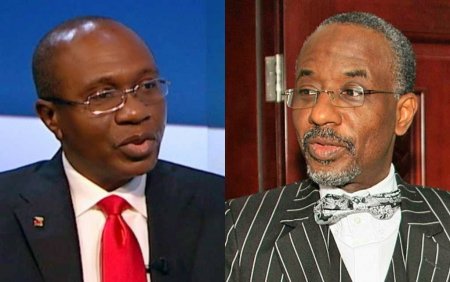L
LequteMan
Guest
Nigeria- International business news site, Bloomberg, in a report has criticized Governor of the Central Bank of Nigeria, Godwin Emefiele, over his Naira reforms as Nigeria battles the oil price slum and Islamist insurgency in the north and also as the general elections draw nearer.
The report also exalts former CBN Gov sanusi Lamido over the way he managed the currency and Nigeria's economy. Excerpts:
As if the collapse in crude prices, forthcoming elections and an Islamist insurgency weren't enough, investors in Nigeria have another matter to worry about: deciding whether the new central banker is his own man.
Godwin Emefiele, appointed in June after President Goodluck Jonathan suspended predecessor Lamido Sanusi almost a year ago, has focused on stemming currency declines that could damage the government of Africa’s biggest oil producer and economy ahead of Feb. 14 elections.
While oil producers with falling exchange rates from Russia to Malaysia have avoided imposing currency controls, Emefiele’s measures cut daily trading of the naira to less than a tenth of previous levels last month, according to Standard Chartered Plc.
The central bank spent $5 billion defending the exchange rate in the last three months of 2014, reducing reserves to a three-year low of $34 billion, while devaluing the midpoint of the official exchange rate to 168 per dollar from 155 and raising the benchmark borrowing cost to a record 13 percent.
The effect was to reduce daily trading to less than $30 million from $300 million to $500 million and foreign holdings of government bonds in naira to 14 percent of the total from as much as 27 percent in 2013, according to Samir Gadio, Standard Chartered’s head of African strategy.
By contrast, Sanusi liberalized Nigeria’s markets by lifting a requirement for foreign investors to hold local-currency debt for at least one year. That resulted in JPMorgan adding the nation’s bonds to its GBI-EM local-currency indexes in 2012. Foreigners increased their holdings of the securities almost fivefold in the next year, according to Bank of America.
“Sanusi had high credibility in the international markets and both the nature of his exit and the context resulted in an increase in Nigerian risk premium, which has remained,” Jim O’Neill, the former chairman of Goldman Sachs Asset Management, who now works as a Bloomberg View columnist, said in e-mailed comments from London on Jan. 28.
click here to read more
#Nigeria #Bloomberg #Sanusi #Emefiele

The report also exalts former CBN Gov sanusi Lamido over the way he managed the currency and Nigeria's economy. Excerpts:
As if the collapse in crude prices, forthcoming elections and an Islamist insurgency weren't enough, investors in Nigeria have another matter to worry about: deciding whether the new central banker is his own man.
Godwin Emefiele, appointed in June after President Goodluck Jonathan suspended predecessor Lamido Sanusi almost a year ago, has focused on stemming currency declines that could damage the government of Africa’s biggest oil producer and economy ahead of Feb. 14 elections.
While oil producers with falling exchange rates from Russia to Malaysia have avoided imposing currency controls, Emefiele’s measures cut daily trading of the naira to less than a tenth of previous levels last month, according to Standard Chartered Plc.
The central bank spent $5 billion defending the exchange rate in the last three months of 2014, reducing reserves to a three-year low of $34 billion, while devaluing the midpoint of the official exchange rate to 168 per dollar from 155 and raising the benchmark borrowing cost to a record 13 percent.
The effect was to reduce daily trading to less than $30 million from $300 million to $500 million and foreign holdings of government bonds in naira to 14 percent of the total from as much as 27 percent in 2013, according to Samir Gadio, Standard Chartered’s head of African strategy.
By contrast, Sanusi liberalized Nigeria’s markets by lifting a requirement for foreign investors to hold local-currency debt for at least one year. That resulted in JPMorgan adding the nation’s bonds to its GBI-EM local-currency indexes in 2012. Foreigners increased their holdings of the securities almost fivefold in the next year, according to Bank of America.
“Sanusi had high credibility in the international markets and both the nature of his exit and the context resulted in an increase in Nigerian risk premium, which has remained,” Jim O’Neill, the former chairman of Goldman Sachs Asset Management, who now works as a Bloomberg View columnist, said in e-mailed comments from London on Jan. 28.
click here to read more
#Nigeria #Bloomberg #Sanusi #Emefiele


